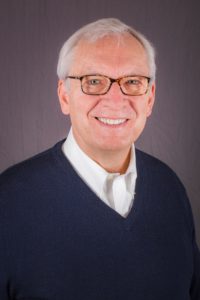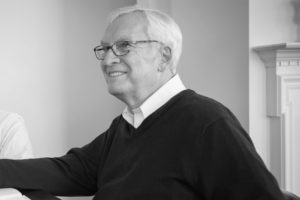
Leith Anderson, President of NAE
“Dear Dad, I’m thinking about dropping out of college, so I can do something significant for God instead of wasting my time going to school.” So started my freshman letter to my father.
It seemed to me that going to college and possibly to graduate school was too much work, too much money, and a waste of too much time while living in a world that needed Jesus. I figured I could invest my life better in a community rather than on a campus.
My father wrote back, with a letter that changed my life. Although I did not save it, I certainly remember its contents.
Dear Leith,
When I was about your age, I weighed the same decision. I was passionate
for ministry and wanted to quit school. I asked for advice from Dr. Donald Barnhouse, pastor of Tenth Presbyterian Church in Philadelphia. Barnhouse told me that if he had 10 years to live he would spend nine in preparation and one in ministry. He was convinced he would accomplish more
for God in that one year than he would have accomplished in nine years of
ministry with only one year of preparation. He advised that sharpening the axe before chopping the tree means you’ll have chopped more wood by the end of the day.
Love,
Dad
Higher education wasn’t easy for my dad. His parents attended grade school and no more. He dropped out of high school when he was 16. When he believed in Jesus and was drawn to ministry in his late teens, he decided to go back to school. The journey was hard—Bible school at night, back to high school with teenagers in the fledgling church he started, and then college, seminary and graduate studies. It took him more than nine years but led to an amazing lifetime of ministry. He served in missions and evangelism, pastored a large metropolitan church for 33 years, and became a college president.
It took a long time for me to follow his advice—college, seminary and more. Now on the far side of that teenage decision to fully prepare, I am convinced that much more has been accomplished for Christ and his kingdom than if I had quit school when I was 18.
What’s Trending

Seminary education has changed a lot in our 21st century. Some changes are good, some are counter-productive, and many are still hard to figure out. Not all apply to every school, theological tradition, denomination, socio-economic group or geographical region, but most are common in America.
- Ministry before education. Many seminary students already hold ministry positions before their first classes. Largely gone are the days when a 21 year-old college graduate starts seminary and graduates with an MDiv at 24 and then applies for a first pastoral job. While this means that many are in ministry without theological education, it also means that many in seminary have a passion for being there and come from actual ministry experience.
- Praxis over theology. Focus on leadership and success rather than biblical knowledge and theological orthodoxy has kept thousands of church leaders out of seminary. They figure that doing the job is more important than mastering the theories. Although this has pushed seminaries to teach more about leadership, it has left many churches with leaders who don’t know much about church history, biblical theology, hermeneutics or heresies to avoid.
- Drive-thru seminaries. Full-time seminary students are a minority. Many register for one or two courses each semester and take many years to graduate. The good news is that this often connects seminary education with church ministry and allows full engagement with each course. The bad news is that too many never graduate, there may be less connection with fellow students outside of classes, and there are financial and relational strains on the seminary as an institution with so many part-time students.
- High expectations of pastors. Pastors have always faced high demands, but the level of expectations has rapidly risen. The internet has given easy access to the country’s best preachers—and local pastors are often expected to compete. Pastors are expected to be masters of leadership, counseling, communication, management, finances, biblical truth, theological expertise and current social issues. In a country with polarized politics, pastors struggle over which side to take or try to keep neutral—and, no option seems acceptable to all parishioners. These high expectations raise the value of having a high quality seminary education.

- High debt and low pay. The rationale for student loans is that they lead to high paying jobs after graduation. That may work for medical school and MBAs but seldom for seminary and MDivs. Ministry is a high calling with great satisfaction but not great salary. Many seminary students arrive with student loan debt, which may be doubled if married to another college graduate.
- Distance and online studies. Distance education allows theological study to ministers who might otherwise not have accessed a seminary education. The benefits are enormous for many, but not best for all. Schools, students, churches and accrediting agencies are still figuring out how distance education works best.
- Old and new seminaries. The list of American seminaries has been shifting. There are historic old schools struggling to survive with declining enrollment and rising costs. Some have closed or merged. At the same time, new seminaries have multiplied—especially “boutique” seminaries based in local churches that are focusing on specific styles of ministry and training in specific theological genres. Standards enforced by denominational credentials have favored more traditional schools, and nondenominational entrepreneurship has favored start-up schools.
- Diversity. Evangelical seminaries have become increasingly diverse in gender, race and ethnicity. As diversity has increased in congregations, especially through church planting, so diversity has grown among faculties and students. Greater diversity is still needed, but the trend holds promise for churches and pastors as American demographics are rapidly moving us toward becoming a more diverse nation.
- Lay leaders coming to seminary. Seminaries have moved to accommodate students who are and plan to be lay leaders. They don’t anticipate ordination or vocational ministry. Seminaries have adapted to this trend with new degrees, distance learning, night classes, special courses and off-campus venues.
What To Do
According to Mark Twain, “Do the right thing. It will gratify some people and astonish the rest.” Except it’s not easy to figure out what is the right thing when it comes to trends in theological education.
Theological education is a priority because it is essential for protecting biblical orthodoxy. The significance of seminary education goes beyond institutional strength and student degrees—the future of the church and the truth of Christianity are at stake. Solid theological education is our protection against heresy, religious syncretism and spiritual decline.
When serving as the longtime pastor of a large church, I constantly promoted and budgeted for seminary educated pastoral staff. We hired pastors with theological degrees. When laypersons joined the ministry staff, the church required them to go to seminary, underwrote all the costs, and provided paid time to go to class. This was an investment for the local church but also an investment in evangelicalism and the future of the kingdom of Jesus Christ. The church supported my own doctoral education, my service as interim president of Denver Seminary for years (while simultaneous pastoring in Minnesota), adjunct seminary teaching, and chairing the board of Bethel College and Seminary (now Bethel University). All of this is to say that seminary education was a very high priority for me and for the church.
- What should churches do? Value theological education. Connect to Ashland Seminary (or another seminary if geography or affiliation is different). Promote seminary education in public statements, congregational staff, church budget, prayers and other specific actions.
- What should seminaries do? Recruit and retain full- and part-time faculty members who are evangelical in theology and passion, are personally engaged in local church ministry, are role models for ministry, are excellent communicators and have strong interpersonal relational skills. All of these qualifications make for higher expectations among faculty and students. Manage costs well to limit student debt. Prepare future alumni to be lifelong practitioners who know and think theologically. Remember that most graduates will become pastors not professors.
- What should students do? Get the best possible theological education. Take the time and spend the money to “sharpen the axe” for a lifetime of effective orthodox ministry in a high expectation calling. Become a disciplined money manager—you will need it! Build relationships. Maintain strong connections with faculty, fellow students, and local churches—these will be among the best takeaways of your seminary education.
On D-Day in 1944, General Dwight Eisenhower told the Allied forces, “The eyes of the world are upon you. The hopes and prayers of liberty-loving people everywhere march with you.” Although the timing, circumstances and callings are all different for theological seminarians, the significance is great—the eyes of the church are on our seminaries; the hopes and prayers of Christ-loving people everywhere march with you.
Leith Anderson is president of the National Association of Evangelicals based in Washington, D.C. The NAE is an umbrella organization with 40 member denominations, hundreds of evangelical organizations, churches, schools (including Ashland Theological Seminary) and individuals. He is a graduate of Moody Bible Institute (Chicago, Illinois), Bradley University (Peoria, Illinois), Denver Seminary (Denver, Colorado), Fuller Theological Seminary (Pasadena, California) and holds several honorary doctorates. He pastored in Colorado and at Wooddale Church in Eden Prairie, Minnesota.

Theological seminaries need to develop alternative delivery systems that have two foci: theological education within a relational context. So much theological education is available in books; relationships cannot exist within a book but within some sort of community of from two to 4 or 5, not a group of 6+. Thus the academic must be coupled with the relational which will make a major challenge for many seminary profs who are more comfortable lecturing to a class of 2 or 200!
I got behind the wheel in 1960 and graduated from Seminary in 1965. During teen and seminary years not a single word was said about the advancing threat of the sexual revolution, contraception, then divorce and remarriage, being the issues of the day – both battles we eventually lost or surrendered. In 1930, dissenting British bishops at Lambeth warned (unheeded) of disaster to come by their affirmation of contraception, namely increased promiscuity and abortion. We have now seen surrogacy, selling baby parts, same sex marriage and now transgenderism. The Huns are at and inside the gate seeking a victory we handed them. If we do not repent of contraception and remarriage, there are more “Huns” waiting their turn. Contraception redefined marriage as to its central (not its only) function. Remarriage redefines it as to its permanence. S/s marriage redefines it as to its sexual composition. Waiting in line are a return to polygamy and group marriage, redefining it as to its numerical composition, incestual marriage, redefining it as to its relational or filial composition, slave/child/forced marriage redefining it as to its consensuality, to name a few. Meanwhile, voices are beginning to clamor further for recognition of pedophilia, bestiality and even necrophilia. There is no bottom to the pit of evil desire which knows no point of satisfaction. Having accepted contraception and remarriage, if we fail to revisit and repudiate both, eventually, we will most likely end up with the rest of the devil’s package waiting impatiently at the door. And if all of this can incrementally be accepted out of so-called “love,” God help us. Except that the only hope might be to walk away from our churches and start over again underground as believers in communist and other totalitarian lands often do.
Thanks, Leith. This is outstanding (as always)!
Years ago, one of my sons graduated from Cornell University with a degree in physics and astro-physics. When he returned to Colorado, he discovered that the best job he could find was with NOAA. He believed that, in spite of his degree, he was basically doing glorified secretarial work. THEN – his office decided they would modernize their office by adapting computer programs developed by AOL. NOAA decided to send my son to the school being conducted by AOL to teach offices how to adapt their computer systems to the AOL system. In the meantime, my son had begun work on his Masters work through C.U. at Boulder. While involved in the AOL school, my son struck up a friendship with the teachers and they began to discuss computer games. Before the classes had ended, AOL had offered my son a job with AOL, in Florida, helping to develop computer games. AOL also offered him twice the salary which he had been earning with NOAA. What to do? M son spoke with his advisors at C.U. Boulder and they agreed to allow him to continue his Masters work via computer, so my son took the job with AOL, moved to Florida, continued his Masters work with C.U. Boulder via distance education, returning to Colorado during his two-week vacation from AOL in order to defend his thesis. After graduating from Cornell – and before returning to Colorado – my son spent two years with a mission in Japan, which specialized in teaching “real American” English to high school students whose parents hoped the students would eventually be able to study in the U.S. My son MIGHT have gone into ministry – he was certainly enthused about the work being done b the mission in Japan, because the mission had become a way for Japanese Christians to witness to non-Christian Japanese neighbors! My son had taken Japanese and German as his elective language courses at Cornell because he believed the best technical journals were written in either Japanese or German! My son was eventually hired away from AOL by Apple and currently works in California. My son certainly had an inclination toward ministry – and still has an interest, because he and his family have led young people on mission trips to Nicaragua in the last several years. But – there were NO seminaries who would have been willing to make the advanced education via distance learning plus gainful employment combination available to him the same way that AOL and C.U. Boulder were willing to make that combination available to him. In the meantime, my other son did his service with U.S. Army Reserves, attended police academy and worked with the Dallas, Texas Police Department. While recovering from gunshot wounds, my second son took some ministry classes at a local university and eventually decided that he was being called to full time ministry. After taking a number of courses at Christ for the Nations in Dallas, Texas, my second son and his family were called to ministry by a church in Managua, Nicaragua. While my second son would LIKE to have more education – he doesn’t feel that it would be wise to leave the mission in Nicaragua in order to return to the states for more education. Unlike Cornell University and C.U.. Boulder, Christ for the Nations struggles with accreditation questions. Unlike C.U. Boulder, there are NO seminaries which would find a way to work out a way for my second son to remain as a missionary in Nicaragua at the same time that he “sharpened” his educational tools. And where would there be any seminary anywhere which would be able to count service in the U.S. Army Reserves, service at the Dalles, Texas Police Depart,eat and 16 years as a missionary in Managua, Nicaragua as “credit” toward a degree? In the real world, bricks and mortar businesses are giving way to Internet businesses. the Office Depot store which I once visited for shopping no longer exists – but I can still place an order with Office Depot – and have my order delivered the next day – because I can place my order online and Office Depot now only needs a few large warehouses, as opposed to a fleet of bricks and mortar stores. Perhaps seminaries need to get over the notion that they need large bricks and mortar campuses, all of which need to have heat and electricity and other expensive maintenance – and focus on finding ways to make it possible for distance education systems to receive accreditation.